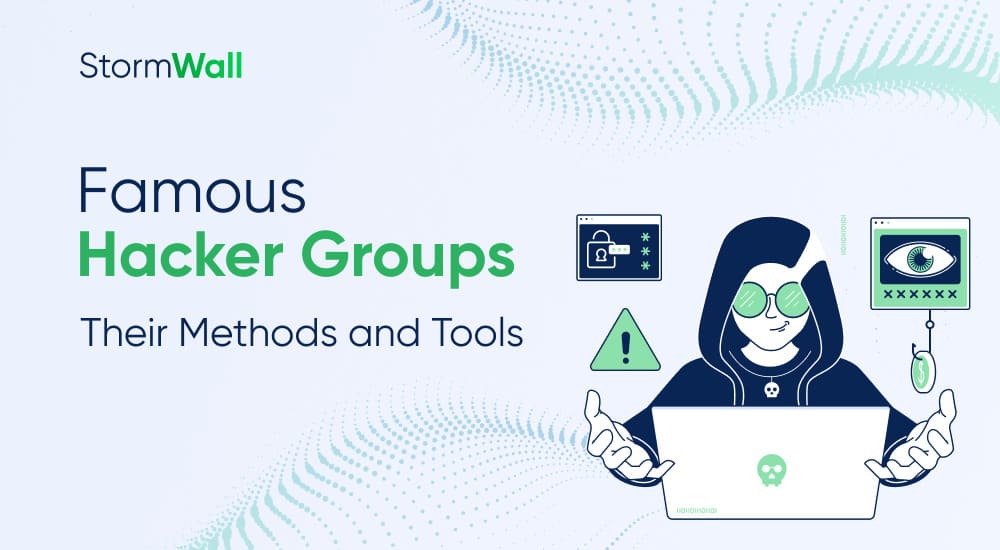Cyberattacks have evolved into complex, large-scale operations. These attacks, carried out by organized hacker teams, leverage advanced technology to conceal their activities and avoid detection. Despite their secretive methods, many of these groups openly boast about their exploits, frequently making headlines.

This article delves into some of the most known hacker teams, highlighting their tools, tactics, and the legal consequences their members may face.
The Anatomy of a Hacker Group: Top 5 Characteristics
Understanding the difference between a lone hacker and an organized cybercriminal group is crucial. While both can cause significant damage, organized groups pose a far greater threat due to several key characteristics:
- Organization and Structure: These groups operate with military-like precision, with each member playing an assigned role — whether leading the group, developing malware, managing finances, or handling public relations.
- Scale of Operations: Unlike individual hackers, these groups conduct attacks that can cripple entire industries or regions. Their targets often include large corporations and government institutions, requiring meticulous planning and extensive resources.
- Advanced Technologies: Hacker groups use zero-day exploits, sophisticated phishing techniques, and adaptive malware that can bypass standard security measures.
- Commercialization and Monetization: These cybercriminals aren’t just in it for fun—they’re in it for the money. From extortion and data theft to offering their services to the highest bidder, these groups have turned hacking into a profitable business.
- Anonymity and Secrecy: To avoid capture, group members operate under pseudonyms and use anonymizing networks and encrypted communication channels, making it nearly impossible to trace their activities.
Notorious Hacker Groups
Several hacker teams have gained infamy through high-profile attacks that have sent shockwaves through industries and governments worldwide. Here’s a closer look at some of the most notorious groups, their methods, and the impact of their actions:
Anonymous
Formed in 2003, Anonymous is a decentralized group of cybercriminals known for their cyberattacks on government and corporate websites. Their activities are driven by a commitment to freedom of speech and opposition to censorship. One of their most notable campaigns involved launching DDoS attacks against Visa, MasterCard, and PayPal in 2010, in response to these companies’ refusal to process donations to WikiLeaks.
Lizard Squad
Known for their disruptive DDoS attacks on gaming servers, Lizard Squad gained notoriety in 2014 after taking down PlayStation Network and Xbox Live during the holiday season, leaving millions of gamers frustrated worldwide.
KillNet
Specializing in politically motivated DDoS attacks, KillNet made headlines in 2022 when they targeted government websites across Europe in protest against sanctions on Russia, causing widespread disruptions.
NoName057(16)
A relative newcomer to the cybercrime scene, NoName057(16) is known for politically or financially motivated DDoS attacks. In 2023, they launched a large-scale assault on several U.S. financial institutions, temporarily crippling online services and causing widespread panic and financial loss.
BlackMatter
Specializing in ransomware, BlackMatter epitomizes the commercialization of hacking. In 2021, they attacked NEW Cooperative, a major player in the U.S. agricultural sector, encrypting critical data and demanding a $5.9 million ransom. The group threatened to release confidential information if their demands were not met.
APT31 (aka Zirconium)
Often linked to cyber espionage, APT31 targets government structures and political organizations. During the 2020 U.S. presidential election, they attempted to hack into the accounts of voters and political entities, using phishing and social engineering techniques to access confidential information and potentially influence the election outcome.
Syrian Electronic Army (SEA)
Supporting the Syrian government, SEA gained infamy in 2013 by hacking the Associated Press’s social media account and falsely reporting explosions at the White House, causing temporary chaos in the financial markets.
LockBit
LockBit develops malware used that encrypts victims’ data and extorts ransom payments by threatening to leak sensitive information. The group operates under the Ransomware-as-a-Service (RaaS) model, providing malware to affiliates who carry out attacks and share the ransom proceeds with the developers.
Often described as the “kings of blackmail,” LockBit was involved in nearly half of all ransomware incidents worldwide and is estimated to have generated more than $1 billion in profits. The group disrupted operations at the UK’s Royal Mail and the world’s largest bank, ICBC, stole confidential data from Boeing, and targeted hospitals, schools, and government institutions.
The US Department of State accused the Russian national Dmitry Khoroshev of creating the group and announced a $10 million reward for information leading to his arrest. In 2024, law enforcement agencies breached LockBit’s infrastructure and seized encryption keys, but the group’s activity did not come to a complete halt.
REvil / Sodinokibi
REvil was one of the most aggressive ransomware groups, operating out of Russia and following the RaaS model. It relied on a wide range of techniques to steal data and pressure victims, including exploiting vulnerabilities in public-facing services, phishing campaigns, and DDoS attacks. The group also compromised bank accounts and laundered stolen funds.
Between 2019 and 2021, REvil targeted major organizations such as US-based IT company Kaseya—where 1,500 customers using its VSA network management software were affected—along with Apple, Acer, and currency exchange operator Travelex. Global meat producer JBS was forced to halt production and pay an $11 million in ransom. The group also leaked internal data from the Washington Police Department and targeted government institutions in Texas.
The scale of the threat reached the highest political levels. Former US President Joe Biden personally urged Russian President Vladimir Putin to shut down the group. In 2022, eight REvil leaders were arrested, tried, and sentenced to prison terms ranging from 4.5 to 6 years. Four members were released immediately after sentencing due to time already served in pretrial detention. The group is currently inactive, although former members may now be involved in other cybercriminal operations.
ALPHV / BlackCat
ALPHV emerged in 2021, combining tactics employed by earlier ransomware groups. It employs proprietary malware written in Rust, reinforces extortion by launching DDoS attacks against victims’ websites, and works with affiliates who receive a share of the ransom.
Read more: Blackmail by Hackers: Ransom DDoS (RDDoS)
The group’s attacks have spanned Europe, the United States, Southeast Asia, and the UAE. In 2023, ALPHV targeted major US entertainment companies Caesars Entertainment and MGM Resorts, and stole approximately 80 GB of data from Reddit. That same year, the FBI breached the group’s infrastructure, but its operations were quickly restored. In 2024, ALPHV announced it was suspending its activity following an attack on Change Healthcare. According to reports, the decision was linked to internal disputes over the distribution of a $22 million ransom.
The Dark Overlord
The Dark Overlord is another international ransomware group known for its aggressive public extortion tactics. The hackers openly post ultimatums on their own accounts and demand ransom payments in Bitcoin. This approach eventually led to the group being banned from multiple online platforms, including Twitter and Reddit.
Among the group’s most high-profile targets were entertainment giants Netflix and Disney. In 2017, after Netflix refused to pay the ransom, The Dark Overlord leaked unreleased episodes of the popular series Orange Is the New Black.
Law enforcement agencies eventually managed to partially disrupt the group’s operations. In 2020, one of its members, Nathan Wyatt, was sentenced to five years in prison.
TWELVE
TWELVE is a politically motivated hacktivist group responsible for attacks on over 50 Russian organizations across the logistics, industrial, IT, and retail sectors. To maximize damage, the group uses a combined attack strategy. After encrypting victims’ data, the attackers deploy a wiper—malware designed to permanently erase information and make recovery impossible.
A defining characteristic of TWELVE is its reliance on social engineering. The attackers manipulate contractors and service providers, compromise their infrastructure, and use that access to penetrate the internal networks of target organizations.
In 2024, Telegram blocked TWELVE’s channel for publishing stolen personal data. Despite this, the group quickly resumed its attacks a few months later.
Head Mare
Head Mare specializes in attacks on businesses and government institutions in Russia and Belarus. While hacktivism remains the group’s primary motivation, it also conducts extortion operations. The attackers typically gain initial access through phishing campaigns, distributing RAR archives that exploit vulnerabilities in archive software.
The group claimed responsibility for attacks on Uralvagonzavod, Russneft, an organization affiliated with the Russian Ministry of Defense, and the Krasnodar-based ISP Telecenter. Its most high-profile incident occurred in May 2024, when an attack on CDEK caused a large-scale outage that paralyzed the delivery service for several days.
C.A.S
Active since 2022, C.A.S has been targeting organizations in Russia and Belarus and frequently collaborates with other hacktivist groups, including TWELVE, to carry out large-scale attacks. The group exploits vulnerabilities in publicly accessible services such as Jira, Confluence, and Microsoft SQL Server, and openly documents its operations on a Telegram channel.
C.A.S attacks have affected companies in telecommunications, industry, and retail, including major alcohol producer Novabev Group. In 2023, together with the UHG group, C.A.S breached the ticketing service kassy.ru and sold databases containing millions of users’ personal data on the dark web.
Crypt Ghouls
Crypt Ghouls combines hacktivism with extortion and targets Russian companies and government institutions. In many ways, the group resembles other politically motivated actors: it compromises contractor accounts, operates via VPNs, deploys encryption malware, and maintains close ties with allied groups.
At the same time, Crypt Ghouls employs distinctive techniques to complicate post-attack recovery. After encrypting files, the attackers repeatedly rename them—from “aaaaaaa” to “zzzzzzz”—before deleting the final version, further hindering restoration efforts.
Chaos Computer Club (CCC)
The Chaos Computer Club (CCC), founded in Germany in 1981, is the world’s oldest hacker community. Unlike criminal groups, its members follow ethical principles and do not aim to harm businesses or government institutions. The community focuses on researching the societal impact of technology and advocating for freedom of information and privacy.
While some members have faced legal issues in the past, the organization’s activities today are largely legal. CCC is best known for hosting the annual Chaos Communication Congress, one of the most influential hacker conferences worldwide.
The group gained prominence through a series of high-profile public actions aimed at exposing security flaws:
- In 1984, CCC members breached Germany’s Bildschirmtext system to demonstrate its insecurity and returned the stolen funds the next day.
- In 1987, they discovered vulnerabilities in NASA computer systems and reported them to the CIA.
- In 2006, they compromised an electronic voting system developed by Nedap, which ultimately led to the technology being banned in Germany.
- In 2008 and 2013, CCC exposed weaknesses in biometric systems, even creating replicas of the of the fingerprints of the German interior minister.
| The Creators of the AISURU Botnet A group of just three individuals is responsible for some of the most powerful DDoS attacks in recent history. In December 2025, an AISURU botnet attack against Cloudflare peaked at 29.7 Tbps, setting a new world record. According to experts, the AISURU botnet controls at least 700,000 compromised devices.The botnet uses a mix of attack techniques, including multi-vector attacks, and targets organizations around the globe. In some cases, the attackers hit hundreds of targets at the same time, dramatically increasing the scale and impact of their operations. |
Interesting Facts About Hackers
Who Is the Greatest Hacker?
There is no single answer to this question. Hackers can be assessed in many ways—by technical skill, motivation, impact, or the broader social and political context. That said, several iconic figures have earned legendary status.
Kevin Mitnick is widely regarded as one of the most famous hackers in history. In the 1980s and 1990s, he carried out daring intrusions into systems operated by Nokia, Motorola, and the US Air Force, and the North American Aerospace Defense Command. Initially driven by curiosity and a desire to expose security weaknesses, Mitnick later served time in prison. After his release, he “came to the Light Side of the Force” and became a respected cybersecurity consultant.
John Draper, better known as Captain Crunch, focused on hacking telephone networks. His work revealed serious flaws in telecommunications systems and helped improve security.
Albert Gonzalez gained notoriety for massive credit card data theft. From the TJX retail chain alone, he stole the personal data of 180 million customer accounts. His motivation was purely financial.
A separate group includes hacktivists, who use cyberattacks to advance ideological causes. Aaron Swartz fought for free access to information, downloading academic and government documents from the servers of public institutions and non-profit organizations.
Gary McKinnon carried out what was then the largest breach of military computer systems in 2001–2002, including networks belonging to NASA and the US Department of Defense. He claimed he was searching for evidence of UFOs and alternative energy technologies. The attack resulted in the loss of critical data and disrupted ammunition supply systems.
Julian Assange is best known as the founder of WikiLeaks, a platform that published classified materials. He began hacking at the age of 16, targeting corporate, government, and educational networks, including those of NASA and the Pentagon.
Which Hacker Group Is the Most Powerful?
It’s equally difficult to single out one dominant hacker group. These organizations are evaluated based on different criteria—technical sophistication, financial damage, or ideological influence. However, several groups clearly stand out and continue to shape today’s cyber threat landscape.
Among ransomware groups operating under the Ransomware-as-a-Service (RaaS) model, LockBit, Conti, and REvil are often considered the industry benchmarks.
The Lazarus Group, believed to be affiliated with the North Korean government, is associated with cyber espionage and financial cybercrime. The group attacked banks and cryptocurrency platforms worldwide and is widely suspected of spreading the WannaCry ransomware in 2017. That campaign impacted more than 500,000 computers and thousands of organizations globally.
Hacktivist groups form a separate category. The decentralized collective Anonymous has symbolized digital protest for decades. Groups such as Killnet and NoName057(16) have gained prominence during ongoing geopolitical conflicts.
What Types of Hackers Are There?
Hackers are commonly divided into three main categories based on motivation and legality:
- White-hat hackers are ethical professionals who operate with authorization from system owners. Their goal is to improve security through penetration testing, audits, and responsible disclosure of vulnerabilities. They typically work as in-house specialists or freelancers.
- Black-hat hackers are cybercriminals who operate outside the law. Their primary motives include financial gain through extortion or data theft, as well as sabotage. They rely on tools ranging from phishing kits and trojans to advanced ransomware.
- Grey-hat hackers fall somewhere in between. They operate without permission and have mixed motivations, from curiosity to profit. Hacktivists who attack systems for political or social reasons often fall into this category.
There are also less skilled attackers, such as script kiddies, who use ready-made tools for self-promotion, as well as highly specialized actors like crackers, who break software protections primarily for the challenge.
How Much Do Hackers Earn?
Earnings in the hacking world vary widely. Based on available data, earnings can be broken down into two categories: legitimate cybersecurity salaries and illicit hacker income.
On the global market—especially in the United States—experienced cybersecurity professionals in Silicon Valley or on Wall Street earn over $150,000 per year, with top experts and executives making $400,000 or more. Elite vulnerability researchers participating in global bug bounty programs on platforms like HackerOne can earn over $1 million annually.
Cybercriminal income, by contrast, has no upper limit and is highly unpredictable. According to analysts at F6, typical prices for hacker services as of May 2025 include:
- Access to ransomware affiliate programs—up to $100,000.
- Information on vulnerabilities unknown to the victim—up to $250,000.
- Access to a target organization’s internal network—up to $10,000.
- DDoS attacks—from $30 per day.
In 2024, ransomware operators worldwide earned approximately $814 million. The downside of such profits is the extremely high risk of arrest and imprisonment.
The High Stakes of Cybercrime
Participating in a hacker group is not just a digital misadventure—it’s a serious crime with severe consequences. Governments around the world are cracking down on cybercriminals, imposing hefty penalties and long prison sentences on those involved in these illegal activities. As cyber threats become more sophisticated, our response must be equally robust, with heightened vigilance and preparedness to tackle these constantly changing dangers.

DDoS Protection for Websites
- Activate protection in 10 minutes
- 24/7 technical support




















